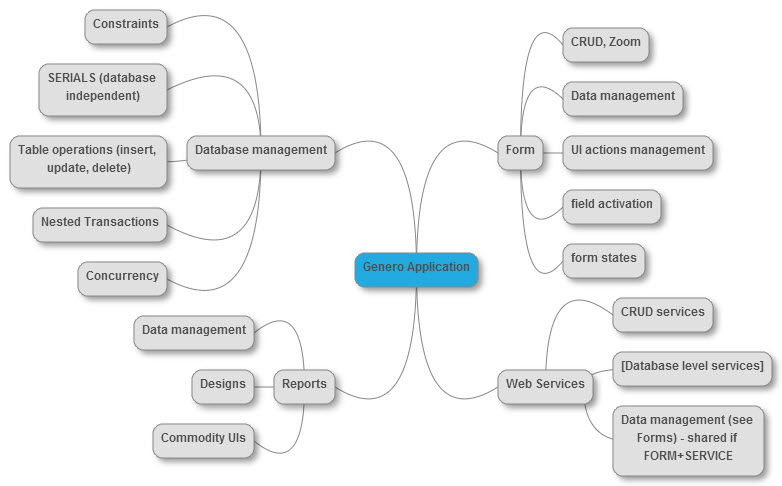The default template set (dbapp3.0) is designed to generate organized and functional code for a data-driven business application.
Code architecture

Figure 1. Overview of features of template set
| Forms | Description |
|---|---|
| CRUD and Zoom forms | The user interface of a generated program is based on the forms created for the program. There are two types of generated forms - CRUD and Zoom. See Add Forms. |
| Form states | See UI Settings (DISPLAY, MODIFY, ADD, SEARCH) |
| Functionality | See Form functionalities (canAdd, canModify, canDelete, canSearch) |
| Lookups | See Lookup fields |
| Pre-filled comboboxes | The values for a combobox list can be automatically retrieved from a database table. Typical usage includes providing a list of state or country values. Define a dynamically populated combobox |
| Data management | The generated code manages query by example (QBE), default values, multiple level data sets, all database operations through the database entity (Database meta-schema (4dbx)), data set key list in memory, and up to date checks before editing. See Modeling the database. |
| UI actions management | The generated code manages a toolbar and menu and the action visibility and enabling, depending on the state of the program. See Default actions, Default TopMenu and Toolbar |
| Field activation | See Field activation. |
| Database Management | Description |
| Constraints | See Database meta-schema (4dbx) |
| Serials | See Managing SERIALs in a generated application |
| Table operations | See Default actions |
| Nested transactions | See Generated and Intermediate Files |
| Concurrency | See Managing concurrency |
| Reports | Description |
| Database management | See Create a business record for reports |
| Designs | See Add a Report Design Document (4rp) |
| Web services | Description |
| CRUD services | A service can be created either from a CRUD form or from a Zoom form. From a CRUD form the web service can have Create, Read, Update, and/or Delete operations. From a Zoom form, operations are limited to Read. See Create service from form. |
| Database level services | See Modeling the database |
| Data management | The generated code manages query by example (QBE), default values, multiple level data sets, all database operations through the database entity (Database meta-schema (4dbx)), data set key list in memory, and up to date checks before editing. See Modeling the database. |